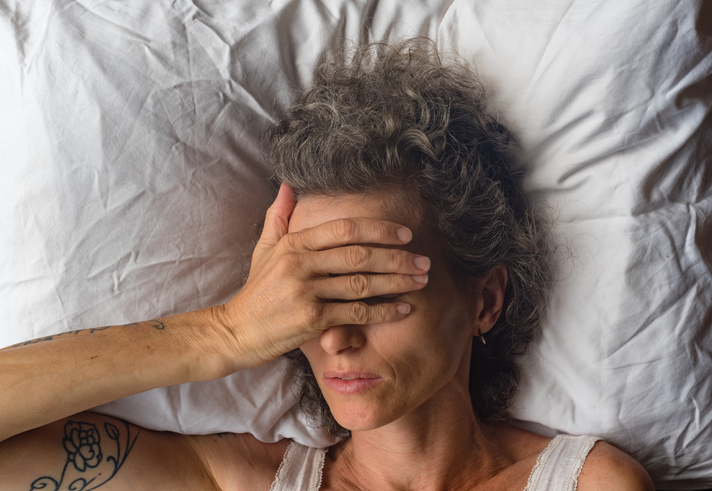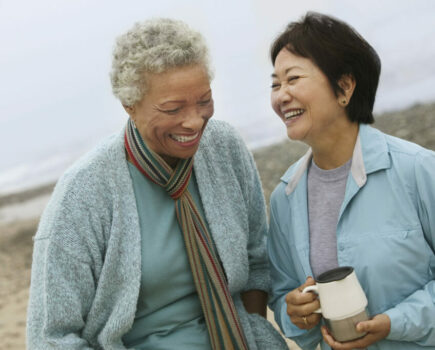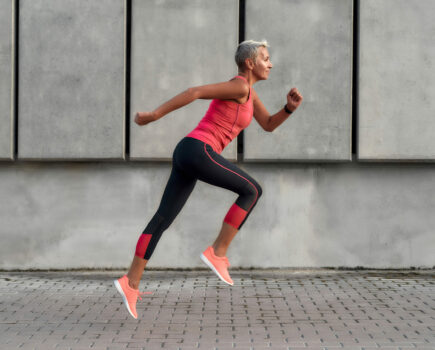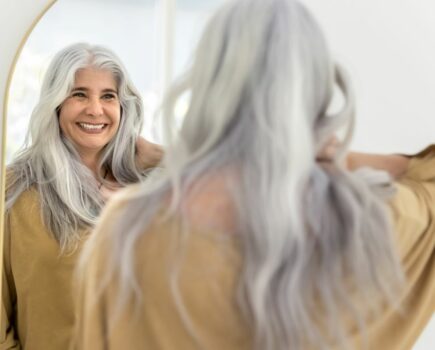A great night’s sleep can leave us feeling rejuvenated and ready to take on the day, but many of us aren’t getting enough of it. These sleep solutions could help.
How many nights of the week do you find yourself lying awake, watching the hors pass, whilst it feels like the rest of the world slumbers peacefully? Supressing resentment at the effortless sleepers around you, you ruminate, make ‘to do’ lists, worry, or just lie there, anxiety levels rising at the thought of how to get through the next day in the fog of home-grown jet lag.
Do you feel you have tried it all?
To date, I have clocked up 18 years of disrupted sleep. Trying endless over-the-counter herbal remedies from valerian to CBD oil, poppy to 5HPT, as well as alternative therapies such as CBT, hypnotherapy, Ayurveda and nutritional therapy.
I take HRT, and in emergencies, have resorted to prescription sleeping pills. I have heeded expert advice and followed a strict regime of sleep hygiene — daily exercise, regular yoga, dimming the lights in the living room from 9pm, wearing earplugs and a caffeine-free life. I have even invested in a gravity blanket, which many people swear by. I recorded the hypnotic music of News at Ten to the sound of which my eyelids never fail to close.
Concerned friends offer their own sleep solutions from sleep apps like Headspace and Calm, online resources such as Sleepio (from the NHS), white noise machines, pillow sprays and body oils, sleeping in a different room or reading a book. Any of these might work for you and many people feel they are worth a try.
In a recent personal experiment, I tried to make friends with insomnia by accepting and appreciating the silent morning hours to enjoy a peaceful cup of coffee; write a journal; fit in those extras such as yoga or exercise, and even indulging in some mindless googling.

But a niggling dissatisfaction remains.
Joy-sapping, sleepless nights leave us running on empty. It’s time to seek new solutions in the quest for sleep, and ask ourselves honest questions about the source of our insomnia.
Dr Neil Stanley has 37 years’ experience in sleep research and is a resident sleep expert for Sleepstation. For him, lying back and accepting our insomnia is not an option.
“A constant feed of panic-inducing articles and books about the detrimental efforts of insomnia are increasing our stress and anxiety around sleep,” says Dr Stanley.
“Our 24/7, time-compressed lives mean that winding down before bed is a thing of the past. Screens, streaming services and the fear of missing out means most people do not relax before bed.”
We are a nation of worriers. Statistics from the 2013-2017 Great British Bedtime Report concluded that almost a third of us are sleeping badly most nights. The three top reasons being stress — with women worrying more than men — partner disturbance and noise.
Latest research from the University of California, Berkeley, has found that the type of sleep most apt to calm and reset the anxious brain is deep sleep, also known as non-rapid eye movement (NREM) slow-wave sleep. If you are not getting this type of sleep due to insomnia then anxiety can increase by up to 30%.
The problem is so widespread that The Sleep Council joined with The Sleep Charity earlier this year to launch a ‘Manifesto for Sleep’, aiming to raise the profile of sleep as a major factor for health and wellbeing and to ensure that sleep becomes a key issue on the Public Health agenda.
Dr Stanley takes a refreshing, down-to-earth approach towards sleep in his book How to Sleep Well.
Adding to our toolbox for a night of smooth slumber, he presents tips and strategies such as not napping during the day, exposing ourselves to natural daylight, and recognising the difference between feeling sleepy and feeling tired or fatigued.
“If you were to climb three flights of stairs, then would you need to sit down or to sleep?” says Stanley. “If you need to sit down, you are tired or fatigued, but if you need to sleep then you are sleepy.
“You can physically exhausted, but still not be able to fall asleep because your mind is racing. So whilst a relaxed body is important, a quiet mind is an absolute prerequisite for sleep.”
He also counsels not to dwell on the ‘do’s and the don’ts’ of sleep. “There is no one size fits all when it comes to sleep,” says Stanley. “Some people can happily drink a double espresso late at night with no impact on their sleep, yet others will be wired for hours. People ask me ‘does chamomile tea help you sleep?’ I reply, if you like the taste and feel more relaxed for having drunk it, yes. Same goes for yoga or listening to music. Identify what helps you.”
Many of the sleep problems in women over 50 are due to the body temperature fluctuations of the menopause. “To get a good sleep you need to lose one degree of body temperature. If you are heating up in the night, this will disturb your sleep,” explains Dr Stanley. “Sociologist Dr Jenny Hislop also claims that women are more liable to sacrifice their sleep for their partners, feeling that their partner’s sleep is more important than theirs.”
Dr Stanley believes we would do well to shake off the fears and hang-ups fuelled by sleep myths. We don’t necessarily need 8 hours’ sleep a night if we feel awake and vital on less. Nor can you train yourself to be a ‘morning person/lark’ if you are an ‘evening person/owl’, as this is largely genetically determined.
“Forget about your bed facing north, or drinking a banana and cherry smoothie at night,” he says.
Establishing a 30-minute pre-bed wind down routine is crucial. Most of us merely lock the front door, brush our teeth and hop into bed hoping to meet Morpheus in a matter of minutes. “The wind down will signal to the body that it is time to sleep and will allow you to put the stresses and worries of the day behind you,” advises Dr Stanley.
“Switch off the computer, don’t argue, or open the gas bill. Seize the moment and go to bed when you are sleepy, not when your TV programme has finished or when your partner wants to. Look forward to the sanctuary of your bedroom, reserved for sleep with a pleasant, relaxing environment — not too hot or old. And if you are awake for 20 minutes in the night, get up and do something different until you feel sleepy again.”
Helping to calm our mind is the key focus for yoga teacher and psychotherapist Lisa Sanfilippo is her new book Sleep Recovery. “’I can’t switch off’ is the number one complaint I hear,” says Lisa. “But we are not machines that can switch on and off. We’re more hyper-alert as a culture. That shift between the waking alert state and the calm state as a way into sleep has eroded for many.”
Lisa feels that many women struggle with sleep due to the pressures they face to ‘do it all’. “We care for our ageing family members, we woke for more years. Plus, we try to keep fit and take pride in our appearance. All this takes time away from our beds and rest.”








